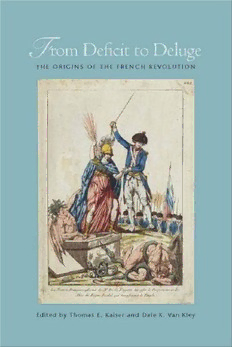
From Deficit to Deluge: The Origins of the French Revolution PDF
Preview From Deficit to Deluge: The Origins of the French Revolution
from deficit to deluge FROM DEFICIT TO DELUGE The Origins of the French Revolution Edited by Thomas E. Kaiser and Dale K. Van Kley stanford university press stanford, california Stanford University Press Stanford, California © 2011 by the Board of Trustees of the Leland Stanford Junior University. All rights reserved. An earlier version of Chapter 3 was published in Peter R. Campbell, ed., The Origins of the French Revolution, 2006. Copyright © Palgrave Macmillan. Reproduced with the permission of Palgrave Macmillan. No part of this book may be reproduced or transmitted in any form or by any means, electronic or mechanical, including photocopying and recording, or in any information storage or retrieval system without the prior written permission of Stanford University Press. Printed in the United States of America on acid-free, archival-quality paper Library of Congress Cataloging-in-Publication Data From deficit to deluge : the origins of the French Revolution / edited by Thomas E. Kaiser and Dale K. Van Kley. p. cm. Includes bibliographical references and index. ISBN 978-0-8047-7280-8 (cloth : alk. paper) ISBN 978-0-8047-7281-5 (pbk : alk. paper) 1. France—History—Revolution, 1789–1799—Causes. 2. France—History— Revolution, 1789–1799—Historiography. I. Kaiser, Thomas E. II. Van Kley, Dale K., 1941– DC138.U55 2011 944.04—dc22 2010014332 Contents Acknowledgments ix Introduction 1 Thomas E. Kaiser and Dale K. Van Kley 1 Financial Origins of the French Revolution 37 Gail Bossenga 2 The Social Origins of the French Revolution Revisited 67 Jack A. Goldstone 3 The Religious Origins of the French Revolution, 1560–1791 104 Dale K. Van Kley 4 From Fiscal Crisis to Revolution: The Court and French Foreign Policy, 1787–1789 139 Thomas E. Kaiser 5 Enlightenment Idioms, Old Regime Discourses, and Revolutionary Improvisation 165 Keith Michael Baker 6 Gender in Pre-Revolutionary Political Culture 198 Jeffrey Merrick 7 Saint-Domingue, Slavery, and the Origins of the French Revolution 220 Jeremy D. Popkin Conclusion: From Old Regime to French Revolution 249 Thomas E. Kaiser and Dale K. Van Kley Notes 271 Index 323 Contributors 343 For Sandy K. Van Kley and Helen Beneš Kaiser Wives who have patiently listened to more than one unsolicited lecture on the French Revolution Acknowledgments Even twenty or more years after the event, any set of acknowledg- ments for a book about the origins of the French Revolution must begin with the series of bicentennial conferences entitled “The French Revolution and the Creation of Modern Political Culture,” especially the first one at the University of Chicago in 1987 on the subject of the political culture of the Old Regime. Organized, as were the others, by Keith Michael Baker, Co- lin Lucas, the late François Furet, and Mona Ozouf, it was that conference in particular and the volume of its proceedings published in its wake that brought three decades of “revisionist” thought to a climax and made the ori- gins of the great Revolution the “problem” that it remains today. In the case of this volume, the debt is quite concrete. Besides Keith Baker and the co- editors of this volume, two other contributors—Gail Bossenga and Jeremy Popkin—are also veterans of that seminal conference. In addition to writing their chapters, both Gail Bossenga and Jack Goldstone went well beyond the call of duty in giving the editors’ in- troduction and conclusion a very close reading, from which those two essays—the bookends of this book, as it were—benefited not a little. It goes without saying that the editors alone remain responsible for the ways in which they mined Bossenga’s and Goldstone’s chapters as well as the others in elaborating the line of argument contained in that introduction and conclusion. In the regretful—and unplanned—absence of any French contributors to the volume, the editors’ introduction and conclusion also benefited from very thorough readings by Yann Fauchois of the Biblio- thèque Nationale and Rita Hermon-Belot of the Ecole des Hautes Etudes et Sciences Sociales. Where other individual chapters are concerned, Jack Goldstone wishes to thank William Doyle of the University of Bristol for a very helpful reading of his chapter, Jeffrey Merrick thanks the Wis- consin French History Group for collective comments in reaction to his
